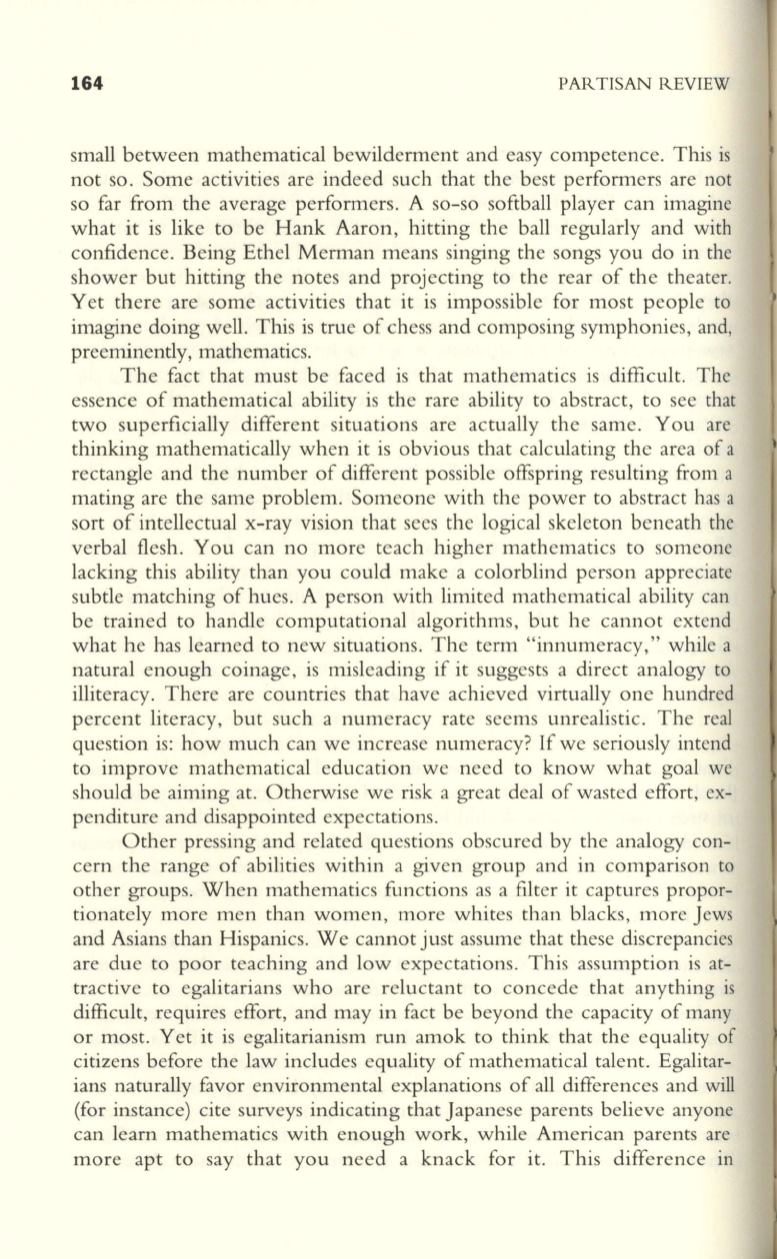
164
PARTISAN REVIEW
small between mathematical bewilderment and easy competence. This is
not so. Some activities are indeed such that the best performers are not
so far from the average performers. A so-so softball player can imagine
what it is like to be Hank Aaron, hitting the ball regularly and with
confidence. Being Ethel Merman means singing the songs you do in the
shower but hitting the notes and projecting to the rear of the theater.
Yet there are some activities that it is impossible for most people to
imagine doing well. This is true of chess and composing symphonies, and,
preeminently, mathematics.
The fact that must be faced is that mathematics is difficult. The
essence of mathematical ability is the rare ability to abstract, to see that
two superficially different situations are actually the same . You are
thinking mathematically when it is obvious that calculating the area of a
rectangle and the number of different possible offspring resulting from a
mating are the same problem. Someone with the power to abstract has a
sort of intellectual x-ray vision that sees the logical skeleton beneath the
verbal flesh. You can no more teach higher mathematics to someone
lacking this ability than you could make a colorblind person appreciate
subtle matching of hues. A person with limited mathematical ability can
be trained to handle computational algorithms, but he cannot extend
what he has learned to new situations. The term "innumeracy," while a
natural enough coinage, is misleading if it suggests a direct analogy to
illiteracy. There are countries that have achieved virtually one hundred
percent literacy, but such a numeracy rate seems unrealistic. The real
question is: how much can we increase numeracy? If we seriously intend
to improve mathematical education we need to know what goal we
should be aiming at. Otherwise we risk a great deal of wasted effort, ex–
penditure and disappointed expectations.
Other pressing and related questions obscured by the analogy con–
cern the range of abilities within a given group and in comparison to
other groups. When mathematics functions as a filter it captures propor–
tionately more men than women, more whites than blacks, more Jews
and Asians than Hispanics. We cannot just assume that these discrepancies
are due to poor teaching and low expectations. This assumption is at–
tractive to egalitarians who are reluctant to concede that anything is
difficult, requires effort, and may in fact be beyond the capacity of many
or most. Yet it is egalitarianism run amok to think that the equality of
citizens before the law includes equality of mathematical talent. Egalitar–
ians naturally favor environmental explanations of all differences and will
(for instance) cite surveys indicating that Japanese parents believe anyone
can learn mathematics with enough work, while American parents are
more apt to say that you need a knack for it. This difference in


